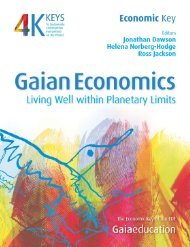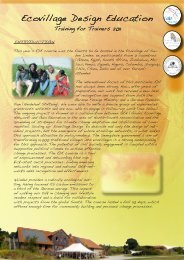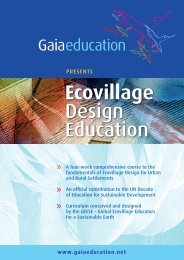Designing Ecological Habitats - Gaia Education
Designing Ecological Habitats - Gaia Education
Designing Ecological Habitats - Gaia Education
You also want an ePaper? Increase the reach of your titles
YUMPU automatically turns print PDFs into web optimized ePapers that Google loves.
Design witH tHe flow 265<br />
Imagine that it took our bodies, yes our human bodies, millions of years<br />
to design a digestive system whereby at the end of a lengthy and delicate<br />
process we excrete the solids through one channel and the liquids are<br />
discharged through another. And to think, in modern buildings, the first<br />
thing we do is mix them with… drinking water! If our method of acquiring<br />
nutrients were to blend solid and liquid waste, then why do we have this<br />
complex system of kidneys, liver and intestines? And if drinking water<br />
can be thought of as a ‘commons’, for which everyone should have ample<br />
access, how can we dump these waste products into the drinking water? It<br />
seems that we are not seeing the connections (again).<br />
Water is the most precious substance on Earth. Drinking-water is expensive<br />
and not easily available to the whole population, so why do we spoil water by<br />
mixing feces and urine in it? Urine is a wonderful liquid. It is very rich in potassium,<br />
one of the core components for making our hearts pump. Urine should<br />
not be wasted but should be ploughed back into the nutrient cycle. Did we forget<br />
that the Roman emperor had the royal privilege of collecting urine from his<br />
citizens? Today, urine and feces are simply discharged and imagined ‘gone and<br />
vanished’. In reality, they end up in expensive water treatment systems where<br />
the organic matter is chemically treated through the expense of massive energy.<br />
The feces are a different matter. After all, that is the reason why they are<br />
separated from the urine in the first place. If you combine feces and urine,<br />
you get a typical smell, one that we really do not like around us. If you<br />
keep feces and urine separate, as was intended, then there is no smell on the<br />
condition that there is a flow of air that dries out the feces rather quickly.<br />
That is the function of the dry separation toilet that has been designed and<br />
operated for many years, while fine-tuned in recent history by Dr. Matts<br />
Wolgast, the Swedish scientist from Uppsala University.<br />
If we reduce the flow of water by eliminating the need to use water as<br />
the transporter of feces and urine to central water treatment plants where<br />
E. Coli and Salmonella thrive, then we save a lot of risks that are linked to<br />
dealing with these potential carriers of illness. We are, of course, aware of<br />
the danger and therefore pour harsh chemicals into the system so that we can<br />
control the potential bacterial infections. Whereas bactericides eliminate the<br />
risk of diseases, they also render the water totally useless. There is no reason<br />
to deal with the health consequences of mixing feces and urine by adding<br />
chemicals – simply do not mix the two as was originally intended!<br />
We think of water as the liquid that flows through pipes from somewhere<br />
where it is in abundance to wherever it is needed. Cities have established<br />
a vast network of water redistribution. Imagine the thousands of miles of<br />
pipe that bring water from the Colorado River to distribute throughout Los<br />
Angeles. Imagine the huge investments upstate New York is making to<br />
install septic tanks in order to preserve its catchment area. And now imagine<br />
what happens to all that rainwater? It is simply drained away! How can this<br />
be possible? The state of Colorado even prohibits residents from capturing<br />
rainwater; yet at a time when water is increasingly costly, how could it ever<br />
be permitted to simply flow into a sewage system when it could generate<br />
electricity or offer irrigation to farmers?







